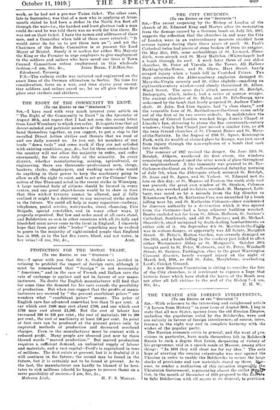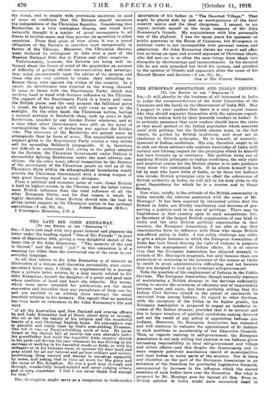THE UKRAINE AND FOREIGN INTERFERENCE. [To THE EDITOR OE THE
" SPECTATOR."] SIR,—With reference to the interesting and enlightened, article "A Lesson from History" in your issue of August 30th, I beg to state that all new States, sprung from the old Russian Empire. including the population ruled by tho Bolsheviks, were and are entirely in favour of foreign interference; of course, inter- ference in the right way and in complete harmony with the wishes of the popular party.
The Russian economic crisis in general, and the want of 're- visions in particular, have made themselves felt in Bolshevik Russia to such a degree that Lenin, despairing of rictory of his programme, said in a speech made at Moscow, among other things : "In 1919 they will shoot me for my idea." The only hope of averting the coming catastrophe was war against the Ukraine in order to enable the Bolsheviks to secure the large stocks of provisions and raw materials stored up there. lbw- ever, to render a realization of this intention impossible the Ukrainian Government, representing almost the entire iIC tion. in the month of December of 1918 proposed to the to fight Bolshevism with all means at its disposal, to provision
the Army, and to supply with provisions countries in need of same on condition that the Entente should recognize the independence of the Ukrainian Republic. Considering that Bolshevism is a very contagious disease, one would have naturally thought it a matter of great consequence to all States to localize same, and thus prevent its spreading to other countries. From that point of view alone, It was a moral obligation of the Entente to interfere most energetically in favour of the Ukraine. Moreover, the Ukrainian Govern- ment declared its willingness to take over a part of the Russian National Debt due to France and other countries.
Unfortunately, however, the Entente not being well in- formed about the frame of mind of the population on account of difficulty of getting efficient communication and investiga- tion, acted unconsciously upon the advice of its enemies and those who are very anxious to retain their dwindling in- fluence there, even against the wishes of the country. As a result, its interference was directed in the wrong channel. It came to terms with the Reactionary Party, which was working hand in hand with German influence in the Ukraine. The support of the Reactionary Party is a heavy pull upon the British purse, and the very moment the full-lined purse is closed, its fighting spirit will melt away as snow in the sunlight. On the other hand, the Ukrainian nation, having a natural aversion to Bolshevik ideas, took up arms to fight Bolshevism, unaided by any foreign Power whatever, and at a time when other Governments were still on the point of contemplating the idea of declaring war against the Bolshe- viks. The successes of the Bolsheviks are gained more by propaganda than by force of arms. The unqualified material support given to the Reactionary Party creates a very fertile soil for spreading Bolshevik propaganda. It is, therefore, not difficult to understand that, owing to the policy adopted by the Entenbe, the Ukrainian Government under Petlura is successfully fighting Bolshevism under the most adverse con- ditions. On the other hand, official recognition by the Entente of the sovereignty of the Ukrainian people as well as of the Ukrainian State within its ethnographical boundaries would provide the Ukrainian Government with a strong weapon of very great bearing equal to many divisions.
From a political and economic point of view. Great Britain is held in highest esteem in the Ukraine, and the latter values more British influence than the total influence of all the other European States, and for that reason it would be highly desirable that Great Britain should take the lead in giving moral support to the Ukrainian nation in her national aspirations.—I am, Sir, &c., Josses Idszamms (B.Sc.). 8 Kensington Mansions, S.W. 5.



































 Previous page
Previous page